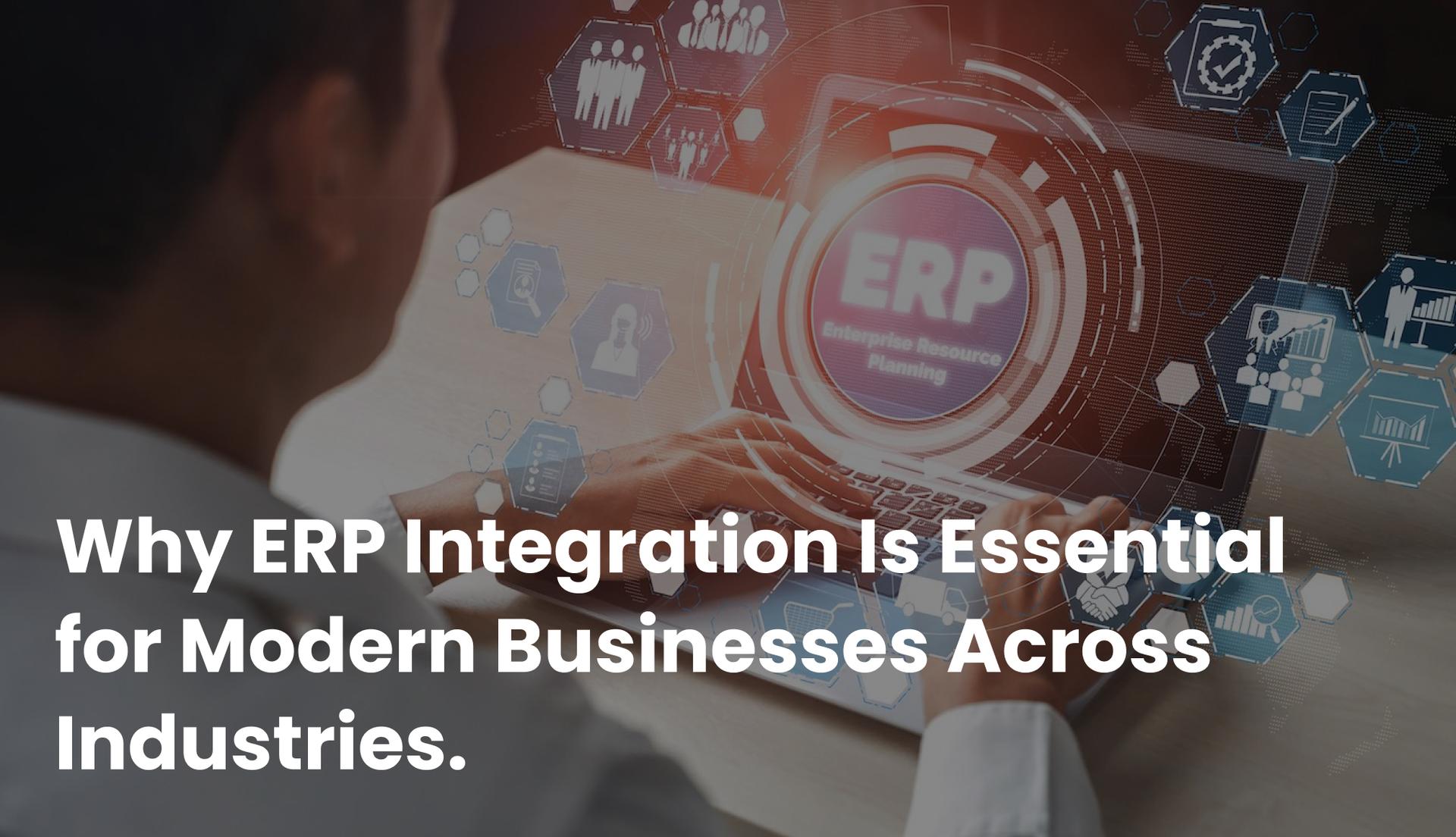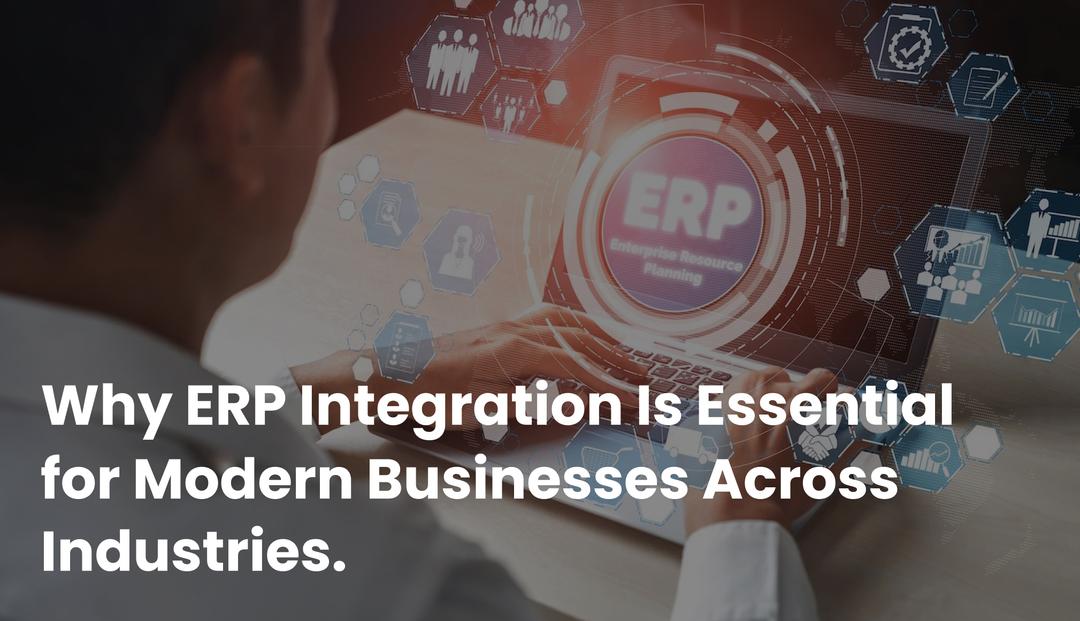Why ERP is essential for customer experience management? Well, In today’s economic climate, delivering outstanding customer experiences across the entire lifecycle is no longer optional, it’s a competitive necessity. Both businesses and consumers now place greater value on customer experience when choosing which brands to engage with. While Enterprise Resource Planning (ERP) systems have traditionally operated behind the scenes, managing functions like accounting and finance they now play a crucial role in enabling these exceptional experiences, not only internally but also throughout the supply chain.
To achieve this, ERPs must integrate with customer-facing platforms such as e-commerce systems, Customer Relationship Management (CRM) solutions, and customer service tools to ensure a smooth, connected journey for every customer.
Given the complexity of operations within modern enterprises, multiple systems and workflows are often in play. To unify these efforts and drive meaningful experiences across all touchpoints, businesses need a modern ERP integration strategy, one that breaks down silos, connects core processes, and empowers organizations to consistently exceed customer expectations.
What is ERP?
Enterprise Resource Planning (ERP) refers to a category of business management software – usually a suite of integrated applications – which helps organizations collect, store, manage and analyze data from a wide range of business operations.
The ERP system is designed to streamline and centralize main business functions such as inventory control and customer relationship management (CRM). They can also be extended with additional modules to support finance, human resources and other major operations.
At its core, an ERP system enables businesses to run important processes from a single, integrated platform. Understanding the role and abilities of ERP software is necessary for companies discovering various deployment options and effective ERP systems, are planning integration.
Our Blogs
CRM vs ERP: What’s the Difference and Which One Does Your Business Need?
Read Now!
What is ERP integration?
ERP integration combines your ERP system with other software – such as ecommerce platforms or EDI systems – hence they can basically share data. It eliminates manual data entry, automatically automates major processes, and ensures frequent, real -time information in all systems.
For example, if a business sells an online product, ERP integration automatically updates the inventory level in both e -commerce and ERP systems, maintaining accuracy without extra effort.
In short, ERP integration enhances efficiency by creating a single source of truth in its business devices.
The above ERP integration diagram indicates that external data from trading partners and ecommerce platforms such as Walmart, Target, Shopify, Amazon and Magento has been fun-easted in a back-end ERP system, acumetica via a back-end ERP system, acumetica via the integration platform.
This flow moves the front-end data to right from the left, where it is converted and is automatically sync with ERP, which enables real-time updates and centralized visibility.
While ERP systems manage the necessary back-end operation, it is their integration with a comprehensive IT ecosystem that runs meaningful business results. The selection between on-radius or cloud ERP solutions depends on your infrastructure and needs-each of their own advantages and trade-offs.
Eventually, your ERP system plays an important role in customers’ satisfaction. How? Through spontaneous integration that keeps operations aligned, accurate and responsible.
10 Reasons ERP Integration is essential for modern businesses (and how AI is changing the game)
We find out 10 compelling reasons why ERP integration is necessary for modern businesses, with special attention to how AI-operated integration is changing operational agility and intelligence in industries.

1- Improved Data Accuracy and Consistency
One of the most immediate benefits of ERP integration is the elimination of data silo. By combining your ERP system with other platforms such as your CRM, ecommerce storefront, or inventory management tools, you ensure that the data is automatically synchronized in all departments.
This level of stability reduces data discrepancies, reporting accuracy, and provides a single source of truth for the entire organization. It is particularly important in industries like manufacturing and finance, wherever small data errors can have expensive implications
2- Enhanced Operational Efficiency
Dissatisfied systems often require employees to input the same data several times in various platforms, wasting time and increasing the risk of manual errors.
By automating these repetitive functions through ERP system integration, business workflows can be streamlined and improve productivity. For example, integrating an ERP with order management and logistics software can automate the entire order-to-cash cycle, reduce delays and improve customers’ satisfaction.
AI-managed integration further enhances this efficiency using intelligent workflows to detect disabilities and recommend procedures adaptation in real time.
3- Real-Time Data Access and Decision-Making
Dissatisfied systems often require employees to input the same data several times in various platforms, waste time, and increase the risk of manual errors.
By automating these repetitive functions through ERP system integration, business workflows can be streamlined and productivity can be improved. For example, integrating an ERP with order management and logistics software can automate the entire order-to-cash cycle, reduce delays and improve customers’ satisfaction.
AI-managed integration further enhances this efficiency using intelligent workflows to detect the disabled and adapt procedures in real time.
4- Cost Reduction Through Automation and Efficiency
Manual procedures and disconnected systems introduce disabilities that quietly increase operating costs. ERP integration cuts these hidden costs by reducing manual workloads, reducing the excess of the system and automatic complex workflows.
For example, the invoice automation through ERP integration can reduce the processing cost of up-to 80%, while the accounts can accelerate the cycles received. AI-operated integration also helps IT departments to customize the use of infrastructure and reduce the requirement of custom code.
5- Cross-Departmental Collaboration and Visibility
When your ERP system is silent with other important equipment, departments such as sales, finance and purchase often work in isolation. Integration ensures that all teams are working with the same up-to-date data, causing more informed cooperation.
For example, marketing teams can use sales forecasts from ERP dashboard, while purchases can see real-time inventory data for data-supported purchase decisions. AI equipment may also recommend associate functions based on historical behavior and current data trends.
6- Elevated Customer Experience
In the era of privatization and quick service, businesses should take advantage of technology to provide better customer experience. The integrated ERP system centralizes customer information – orders, priorities, support history – customer service representative and sales teams rapidly, sewn and allowed to provide accurate support.
By combining ERP with a CRM, for example, businesses can get 360-degree views of each customer, run loyalty and long-term retention. AI can then analyze this data to highlight the hidden insight and to personalize experiences even further. Related conditions vary like Customer-focused ERP, CRM integration, AI for customer service, integrated customer data.
7- Scalability and Business Flexibility
As your company grows, the way your company grows. ERP integration ensures that your commercial systems can easily scale- new procedures, additional users, more data and supporting new technology as required.
AI-Enabled Integration platforms make the scaling even easier by automating the onboarding of new data sources and recommending the best exercise workflow for their specific industry.
8- Agility in a Fast-Changing Market
Market situation may change overnight. Whether it is disrupting the supply chain or a change in customer’s demand, the integrated ERP system gives the businesses fickle needs to respond quickly and effectively pivot them.
AI plays an important role here by providing initial warnings, analyzing real-time data patterns and recommending adjustment-before damage to classes.
9- Improved Compliance and Data Governance
Industries such as healthcare, finance and manufacturing should follow strict rules. The integrated ERP system helps to ensure that the data is collected, stored, and an audit in a way that meets compliance standards.
By maintaining centralized and tracedable records, businesses can prepare for audits, apply data policies, and reduce the risk of non-non-transportation. AI-driven integration compliance can automate check and flag discrepancies, significantly reducing the burden on compliance teams.
10- Optimized IT Resource Allocation
IT teams often prevent countless hours of disconnected systems and maintain custom integration. ERP integration-especially when operated by AI-based platforms-reduces this burden by offering a cum-cod or no-code solution, automatic mapping and error.
This frees your IT department to focus on innovation, not maintenance, enables them to work on strategic initiatives running real business values.Related condition includes, low-code ERP integration, IT resource adaptation, AI for IT operations, Integration-A-Service.
10 Popular ERP Integrations
Customer Relationship Management (CRM) Integration
Integrating CRM systems with ERP software creates a unified view of customer data across the organization. This allows marketing, sales, and support teams to access the same up-to-date information, improving lead management, sales forecasting, and customer service delivery.
CRM-ERP integration enhances customer journey tracking and streamlines communication, ensuring that businesses not only attract customers but also nurture long-term relationships. Salesforce, HubSpot, and Microsoft Dynamics 365 are among the most commonly integrated platforms due to their deep capabilities in analytics and campaign automation.

Supply Chain Management (SCM) Integration
ERP integration with supply chain management platforms provides real-time visibility across the supply chain. It helps improve inventory management, demand planning, procurement coordination, and order fulfillment.
By connecting your ERP to solutions like SAP SCM, Oracle SCM, or Infor SCM, your organization can avoid stockouts, reduce lead times, and respond swiftly to changes in demand or supply constraints—critical benefits in today’s volatile market environment.
Human Resources Management System (HRMS) Integration
The workforce management has become more complicated due to distance work, a transfer job market and new compliance demands. Integrating HRMS solutions such as workdays, ADP, or bamboo with your ERP can simplify processes such as payroll, hiring, onboarding, profit administration and performance tracking.
This integration reduces manual HR functions, ensures compliance, and enables data-powered decisions around the workforce plan, allowing HR to become a strategic property instead of just one cost center.
E‑Commerce Platform Integration
Global ecommerce landscape is rapidly expanding, expected to cross $ 9 trillions by 2027 with sales. ERP-eCommerce integration is no longer optional for retailers and manufacturers; This is necessary.
Platforms such as Shopify, Magento, and WooCommerce can be added to streamline order processing, inventory updates, shipping logistics and customer data management with ERP systems. It improves online shopping experience, reduces cart abandonment rates, and increases overall customer satisfaction in highly competitive digital marketplace.
Financial Management System Integration
Accurate financial reporting is fundamental for professional success. When financial management tools such as quickbooks, zero, or SEZ ERP systems are integrated, companies receive full visibility in cash flow, budget, forecast and compliance.
This connection eliminates fruitless data entry and ensures accurate financial insights on time. It also strengthens CFOs and finance teams with better control over spending and strategic plan, and strengthens financial flexibility.
Business Intelligence (BI) Integration
By combining ERP systems with business intelligence equipment, businesses are allowed to convert operating data into actionable insights. Integration with platforms such as tableau, power BI, or QLIK provides real -time dashboard and adaptable reports.
With ERP-BI integration, business leaders can monitor the major performance indicators (KPI), identify trends, and make data-powered decisions with more confidence, eventually promoting continuous improvement in all departments..
Project Management Solution Integration
Integrating ERP with project management tools provides a complete view of the project deadline, budget, resource allocation and performance. It supports better project execution and alignment with commercial purposes.
Asanas, Trailo and Microsoft projects such as platforms increase cooperation and ensure that all stakeholders are constantly working with data and milestones. This alignment enhances transparency and increases more successful project results.
Customer Service System Integration
A spontaneous customer aid experience is important for retention and brand loyalty. ERP integration support teams with customer service platforms allow the order to reach history, billing records and product descriptions in real time.
Integrated in your ERP with devices such as zendesk or freshdesk, support agents can provide more personal support. This quick problem resolves and results in a more professional, responsible brand image.
Warehouse Management System (WMS) Integration
For businesses managing physical inventory, ERP-WMS integration provides real-time insight into stock levels, warehouse activities and order supply efficiency.
WMS tools such as Manhattan Associates, Fishbowl, and Hyzamps enable better inventory accuracy, low warehouse costs and rapid shipping. Integrating them with your ERP system also supports data-operated warehouse layout adaptation and efficient labor use.
Payment Processing System Integration
Proper and efficient payment processing is important for both B2B and B2C organizations. Integrating payment systems such as PayPal, Stripe, or Square in your ERP allows real -time financial updates, prevention of fraud and rapid harmony.
This not only improves transactions speed and accuracy, but also increases cash flow visibility and simplifies auditing processes, which helps companies to be financially agitated and obedient.
The Challenges of Operating Without ERP Integration
While the ERP system is designed to streamline operations and centralize commercial data, the absence of proper integration between ERP platforms and other business systems may result in a series of operational disabilities, data hurdles and missing opportunities as a result of the absence of proper integration. Below, we find out those major challenges, when companies face when ERP integration is not there-and why reducing this difference is necessary for long-term success.

Siloed and Fragmented Data
One of the most common results of lack of ERP integration is the data silos – when information is stuck within specific departments or applications and is not easily accessible to others. This fragmentation can severely obstruct organizational efficiency and cooperation.
Without integrated systems:
- Teams work with incomplete or old information
- Data duplication becomes common, storage costs and discrepancies increase
- Cooperation in departments is limited
Employees spend valuable time in searching or re -exploring data that are already anywhere else
These silos not only reduce visibility in commercial performance, but also give results in making poor decisions due to integrated, accurate data lack..
Manual and time taking procedures
Modern ERP platforms are designed to automate and streamline the workflows. However, without integration, many businesses bring back the manual processes that consume time and resources.
Consider this scenario: A sales representative logs in salesforce a customer logging. Without ERP integration, a person of the operation team must manually input that data into the ERP system. It opens the door:
- Human error
- Inconsistent data entry
- Delayed update in departments
Such disability limits productivity, reduces agility, and increases the risk of important data through cracks.
Absence of Real-Time Data Visibility
The data-interacted landscape, real-time use is necessary for information to remain competitive. ERP systems are powerful tools to centralize data, but without integration, businesses remember the advantage of real -time synchronization.
Without integration:
- Employees have to log in to many systems to recover or verify data
- Report may be based on old or incomplete information
- Operating delay occurs when decisions manually depend on the insight compiled
This deficiency of immedia is slowing down in decision making and may cause reactions to be delayed for market changes.
Poor customer experience and service intervals
A disconnected ERP system does not only affect internal operations – this negatively affects customer experience. Without integrated data in platforms, businesses are less capable:
- Distribute exact order status or tracking updates
- Personal product recommendations
- Solve customer inquiry efficiently
For example, ecommerce data such as previous procurement or delivery preferences may not be sync with ERP in real time. As a result, delay in customer service, inconsistent message and satisfaction decreases.
Modern customers expect fast, personal and consistent service, which can only be achieved when the ERP system is completely associated with front-end platforms like CRM, Ecommerce and Logistics Tools.
Limited Strategic Value from ERP Investments
Many organizations still see ERP as a strict back-end tool for accounting or inventory. However, the ERP system today is a strategic environment of end-to-end business transformation-but only when they are integrated into the broader IT ecosystem.
When ERP is operated in isolation:
- Its full capabilities decrease
- It becomes difficult to take advantage of AI, automation and future analytics
- Businesses struggle to adapt quickly to new markets or digital channels
The correct value of the ERP solution is unlocked when it originally combines with your partners, marketplace, data stream and customer-support platforms. Integration is the foundation that converts ERP into a dynamic trade driver from an inactive system.
Impact of ERP Integration as a Competitive Imperative
In an era where digital change defines success, ERP integration is not just a technological upgrade – this is a strategic requirement. Whether you are managing a global supply chain, increasing your ecommerce operations, or adapting to service distribution, a linked ERP system provides the foundation for agility, intelligence and development.
And with the rise of AI-operated data integration solutions, all sizes now have more clever, faster and more scalable ways to connect their systems, unite their data and unlock the new price from their technology investment.
FAQs











